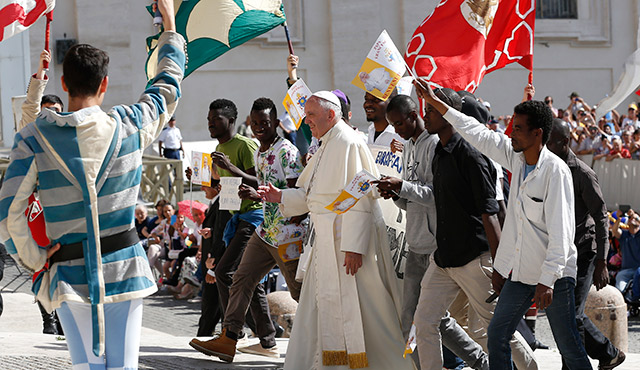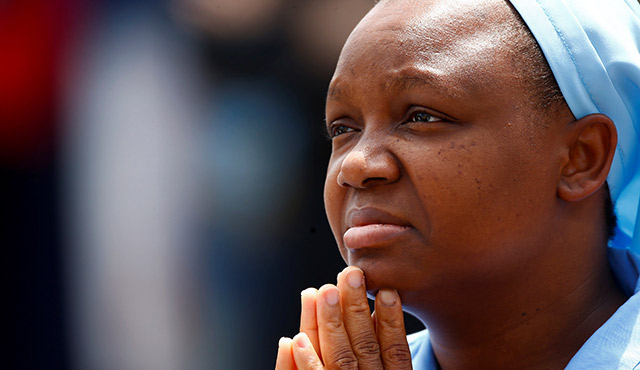Catholicism has been around for more than two millennia, and it isn’t going away any time soon. It will very likely have a huge impact on the world 2,000 years from now.
However, despite dubious claims by strip-mall psychics and crystal ball wizards, we cannot see into the future. All we can do is extrapolate what may happen based on what has already occurred. And given Catholicism’s centuries-long global influence – the religion’s contributions to society and its ability to evolve in an ever-changing world, while managing to stay committed to its fundamental teachings – the Church’s future is secure. Its enduring legacy will continue.
Huge volumes can be written about the Catholic Church’s contributions to the world. Here are but a few:
n Work by Catholic astronomers ultimately led to the Gregorian calendar, today used worldwide.
n Catholic civilization founded the Byzantine, Romanesque, Gothic, High Renaissance and Baroque architectural genres.
n Legal principles such as good faith, reciprocity of rights, equality before the law, international law, trial by jury and habeas corpus all developed from Catholic civilization and jurisprudence.
n Spread by Catholic missions and exploration, the Latin alphabet is now the most widely used alphabetic writing system in the world.
n The development of the university system emerged from Catholic civilization.
“I’m kind of an amateur astronomer, so [my favorite contribution] is the Big Bang Theory,” says Father Troy Schneider, Parochial Vicar of Holy Family Cathedral, in Orange. Father Georges Lemaître first proposed this theory about the origin of the universe.
“And then there’s genetics, Mendel and his peas,” he adds. Augustinian Monk Gregor Mendel founded genetics by studying some 29,000 pea plants. “His purpose was to make more food for those who didn’t have any.”
Msgr. Michael Heher, Pastor of Saint Anne Catholic Church in Seal Beach, adds another one: “Hospitals were developed after sick people came to the monasteries, because the Church always helped those who were ill.”
Today, Catholicism provides contributions to a world that is evolving faster than ever. What really gave the Church a nice kick-start into the modern world occurred a half-century ago: Vatican II.
Vatican II resulted in several groundbreaking changes: the renewal of consecrated life, following the teachings of Jesus in a more exacting way and publicly professing this; the universal call to holiness, a teaching that all people are holy; and ecumenical efforts toward dialogue with other religions.
Other changes included the subtle disuse of ornate clerical regalia, the revision of Eucharistic prayers, an abbreviated liturgical calendar and the celebration of mass with the priest facing the congregation.
“The most important change was that it emphasized the spirituality of the layperson,” says Father Mike. “In earlier times, you had to become a priest or a nun. Laypeople now know that they have a call to holiness as well.”
Father Troy has another take on Vatican II: “To me, the introduction of vernacular into the liturgy was most important. Each country had it’s own language it could use, instead of Latin. That was huge. They could finally understand what the priest was saying.”
However, many followers forget that no changes have been made to basic Church doctrine. The core messages of Catholicism – the very foundation of the faith – have remained the same. What has changed was the way the religion was, and is, presented to its followers.
Today, the Church’s worldwide influence remains strong. Take politics, for example. Although the Catholicism’s stance on abortion and same-sex marriage receive the most attention, the Church continues to advocate for better immigration policies, healthcare reform and nuclear disarmament, among many other issues. “Faithful Citizenship” guides, produced every two years by the U.S. Catholic Conference of Bishops, provide details about Catholic teaching to Catholic voters.
“We don’t back candidates,” Father Mike says, “but we bring our moral conscience to political issues. … Bishops may speak out about the morality of things that are being debated.”
Father Troy concurs: “The lawmakers make the laws, but the Church has the responsibility to inform them about morals and ethics,” he says. “St. Thomas Aquinas said [to paraphrase]: ‘An unjust law is no law at all.’”
We needn’t look too far to see examples of Catholicism’s effect on worldwide politics.
“The best example is Pope Francis’ encyclical on the environment,” says Father Troy. “He agrees with all the science, but he particularly emphasizes our moral obligation to care for our home. Based on the widespread response, it’s clear that the rest of the world is listening.”
Pope Francis has been unusually outspoken in his approach to leading the Church. In addition to climate change, his comments about Church reform and divorce have made headlines around the world. He has criticized the “cult of money” driving the world financial system, called for decentralizing power in the Church, increased financial transparency in the Vatican Bank and approved the creation of a Vatican tribunal to judge bishops accused of covering up or failing to act in cases of child sex abuse. Most notable of all, he has repeatedly emphasized, through his words and actions, that the allegiance of the Church is to the poor.
The Catholic Church has endured through centuries of military, social, urban, industrial, political and digital revolutions. And it has made extraordinary changes – while remaining forever committed to its roots.
“The Church has endured because the Holy Spirit guides us,” Father Mike says. “And it has endured because people have a great devotion to our Lord.”


